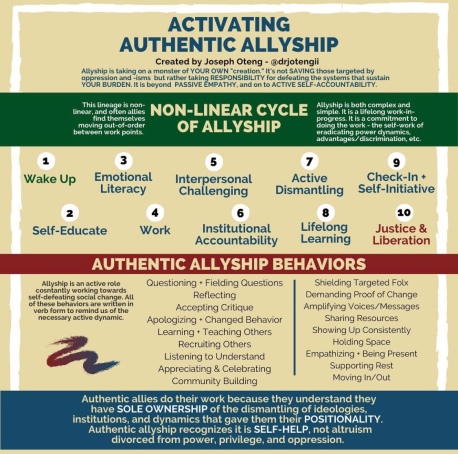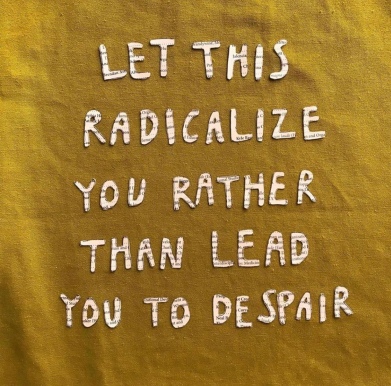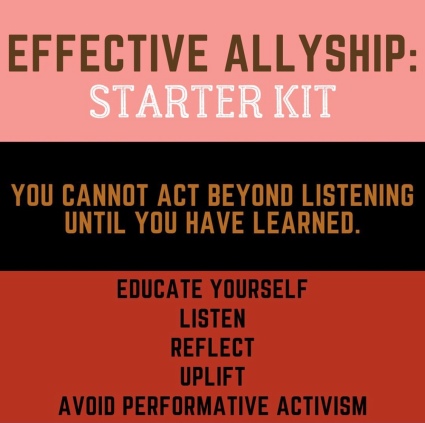As difficult as it may be for non-black people to understand their place and role in the Black Lives Matter movement or The Racial Contract in general, allyship is supremely important. The act and pursuit of being an ally has come to the forefront of conversations in the context of BLM, and this discourse can be a source/tool for growth, learning, and transformation for us all. It must be understood that the black community has been fighting this fight since the very beginning, and the weight of racial injustices, discrimination, and marginalization are truly inescapable. The attempt of this community to convince the world that “black lives matter” has been and continues to be the lived experience that defines and explains the inequalities and inequities perpetuated by American society and culture. The burden of these undeniable injustices has forever fallen on the shoulders of the most oppressed; for this reason, allyship is EXTREMELY important. It can no longer be the work of the most disempowered to challenge the systemic injustice and abuses of power that have forever tainted this nation. We are all responsible for the infringed liberty and life experienced by the most marginalized, and turning a cheek can no longer be an option.
To be an ally is to be more than a non-racist— it is to be an anti-racist. It is not enough to be apathetic towards the black family in your neighborhood, believing that a lack of intense of external hatred equates to the support and uplift being an ally assumes. It is not enough to post a black square and claim solidarity on a social media platform for the sake of joining a trend or fulfilling a boost of the ego, and it is not enough to only be aware of overt racism or the manifestation of blatant white supremacist ideals. To be an ally is to be opening to listening, learning, reading, speaking, and participating (though not leading) in a movement that is needful, good, and just, though may not be particularly relevant to your life or the struggles you experience. It is fighting the fight alongside those who need it most, recognizing that a community may be in need of the tools or power you possess. Allyship is defined by the willingness to engage and actively work to dismantle the inherently oppressive systems and institutions that harm people of color, as well as the openness to lending a hand in solidarity without the expectation that your voice or experience will be the most needed or important to hear. It is the uplift, encouragement, solidarity, compassion, and sometimes protection that privilege may often grant allies in aiding the oppressed progress towards justice and equality. Allyship may be empathy, grief, outrage, accountability, authenticity, and courageous activism & protest. But allyship may also begin with a mere willingness to sit and feel yourself through the potential discomfort of these conversations and realities, an effort to hold oneself and others accountable, or an attempt to create change and introduce new perspectives in your own circle or within your home.
 (Photo: @drjotengi on Instagram)
(Photo: @drjotengi on Instagram)
Allyship is not performative.
Allyship is not virtue-signaling.
Allyship is not self-centering.
Allyship is not white fragility.
Allyship is not a denial of privilege or power.
Allyship is not short-term of temporary.
Allyship is not an undermining of black voices or perspectives.
Allyship is not relying on a hashtag to suffice for one’s participation in the cause.
Allyship is not related to social capital.
Allyship is not exclusionary or selective.
Allyship is advocacy.
Allyship is privilege utilized non-selfishly.
Allyship is solidarity paired with conscious action.
Allyship is going beyond the surface.
Allyship is understanding your position, privilege, and power.
Allyship is recognizing your own capacities within the movement.
Allyship is continually checking in on your black friends, family, and colleagues.
Allyship is being unafraid to be wrong, to speak imperfectly, or to act imprecisely.
Allyship is facing the fire, even when you’re unsure of what the sparks will create.
Allyship is understanding that it is not the job of the black community to teach or educate you about racism or their oppression/mistreatment/trauma.
Allyship is learning.
Allyship evolving.
Allyship is activism.
Allyship is essential.
 (Photo: @melegirma on Instagram)
(Photo: @melegirma on Instagram)
Five Ways to Be an Ally and Activist
- Engage in meaningful conversations. Don’t shy away from difficult discourse or the complex historical and emotional ties to experiences involving race. Care enough to show up, speak up, and involve yourself in every way possible, and attempt to learn how to do the important and necessary work as much as you can.
- Listen. Remain open-minded and kind whilst engaging with or attempting to educate others, and understand that your work and position as an ally may not necessitate or imply that your voice is the most important in the room— we are asking you to stand and fight WITH us, not save us.
- Be willing to hear the voices and validate the experiences of everyone around you, even if their opinion differs from yours. Often, it is those we most disagree with (or who seem to misunderstand or be non-empathetic) that we most need to reach. Refrain from shutting down, unfollowing, blocking, or closing yourself off to people, and try your best to keep the lines of communication open, especially when there is knowledge to be shared and lessons to be learned.
- Research. Understanding history, political and social context, and how theories of race and The Racial Contract have shaped each of our experiences is essential, and now is the perfect time to invest ourselves into learning more about systemic injustice, oppression, marginalized communities, and what it means to be black in America.
- Uplift the voices we, as individuals and as a society, most need to hear. There is much to be learned from the black community during this time, as well as black activists and educators that have and continue to inspire and catalyze change in the form of progress. Hear the voices of black men and women, acknowledge the truth of queer black people and the work & success they have courageously seen, the trails they have blazed, and the power of communal movement.
 (Photo: @nene_collins on Instagram)
(Photo: @nene_collins on Instagram)
Essential Books for Reading
- The Souls of Black Folk, W.E.B. DuBois
- The Fire Next Time, James Baldwin
- Citizen, Claudia Rankine
- How to be an Anti-Racist, Ibram X. Kendi
- White Rage, Carol Anderson
- The New Jim Crow, Michelle Alexander
- Between the World and Me, Ta-Nehisi Coates
- White Fragility, Robin DiAngelo
- Women, Race, and Class, Angela Davis
- The Racial Contract, Charles. W. Mills
Powerful Podcasts for Listening
- 1619 (The New York Times)
- Code Switch (NPR)
- About Race
- Intersectionality Matters! (AAPF/Kimberlé Crenshaw)
- Pod for the Cause
- The Diversity Gap (Dr. Beverly Tatum)
- Pod for the People
- Yo, is this Racist? (Andrew Ti, Tawny Newsome)
TV/Movies to Watch
- 13th (Netflix)
- When They See Us (Netflix)
- If Beale Street Could Talk (Hulu)
- Dear White People (Netflix)
- Crime + Punishment (Hulu)
- I Am Not Your Negro (Amazon Prime)
- The Hate U Give (Hulu)
- Just Mercy (Free On Demand)
- Moonlight (Netflix)
- The Birth of a Nation (Amazon Prime)
- 12 Years a Slave (Amazon Prime)
- Roots (Hulu)
- Malcolm X (Netflix)
Places to Donate/Important Organizations to Know
- Color of Change
- Unicorn Riot
- Black Trans Travel Fund
- My Block, My Hood, My City
- Black Women’s Blueprint
- The Loveland Foundation
- ACLU
- Know Your Rights Camp
- Innocence Project
- The Bail Project
- National Lawyer’s Guild
- Emergency Release Fund
- Femme Empowerment Project



you put sooo many thoughts & truths cohesively into a post on allyship. THANK YOU. I loved your list of what allyship is & isnt.
LikeLike
Hi! I just found you on Instagram! I adore the work and effort you put into sharing resources! You do a splendid job of writing out your thoughts in a way that is both cohesive, unobtrusive, yet firm and with power! Keep up the great work on sharing your thoughts! They are valuable!!
LikeLike